Editor’s note: Award-winning poet Lorna Crozier, like so many Canadians, has been seeking extra comfort in her garden since mid-March of 2020. You can expect more “backyard stories” as we adjust our travel coverage to the times. Meanwhile, cheers to our travelling poet for another fine contribution to T&C’s pages.
By Lorna Crozier
My past Toque & Canoe stories always included a secondary character who spiced up my journeys — a man who, before I would let him fall asleep, composed haiku-like tweets we sent to the editor at day’s end.
He was a fog-driver in Newfoundland, a snake-seeker in Saskatchewan’s Grasslands National Park and a fearless grizzly spotter in the Great Bear Rainforest.
Afterwards, when we returned to our home on Vancouver Island, he would morph back into his more ordinary self, my husband, writer Patrick Lane.
Two things have utterly changed since these last assignments: Given the pandemic, I’m not travelling and when I do go on the road again, Patrick won’t be with me. He died on March 7, 2019.
These days, I come across him in many places, including in the books he wrote, but I’m closest to him in the place we spent so many hours together — our garden.

Photo by Toque & Canoe
As Patrick once did, every morning coffee in hand, I step through the kitchen door and onto the deck that surrounds our backyard pond. It’s the focal point for my nature lover’s tour of the familiar and the strange. Sometimes there’s so much to see, I don’t move past it.
“Pond” seems too small a word for what this garden feature gives me. Maybe an adjective that piles on syllable after syllable better captures its huge significance — pondiferous.
This pondiferous thing contains multitudes. It blasts the senses. Even if it’s dark outside, you’d know the pond was there. The backyard is forever tuned to the splutter and gurgle of water running over stones at the waterfall. No matter what busy chatter occupies your head, your body leans toward it and listens.
In summer, after the sound of water greeting water, it’s the crazy abundance of lilies that grabs your attention. Rising above huge floating platters of leaves, they dab reds and yellows and corals across the surface.
Their scent mixes with the green pungency of algae and the faint whiff of goldfish that swirl in muscular ribbons through the sky’s reflection.
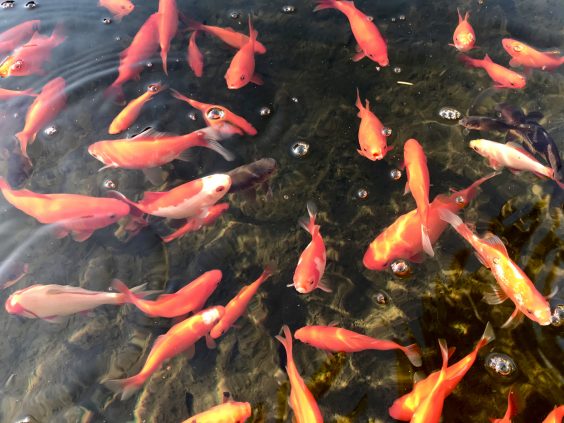
Photo by Toque & Canoe
Every morning, I find something startling, something that reminds me to pay attention to the shifts in the seasons and the other shifts my flesh is heir to — the joys and sorrows that make up an earthly life.
Dozens of newly formed dragonflies flash their jewel-like bodies over the lily pads and drop to drink.
I find their casings, the thinnest of castoffs, clinging to the bulrushes. They are all that is left of the nymphs, the second step in this insect’s metamorphosis. Bug-like aquatic creatures, they live in this wingless ugly-duckling form for about four years.
Then, with more skill and grace than any man-made flying machine, the dragonflies they become hover, dive and zip, catching mosquitoes in mid-air. It’s no surprise they’re expert flyers. They’ve been practising 300 million years.
Swallows, too, skim the pond, beaks open for a quick slurp. And where the water stills and gathers in a shallow bowl on top of the waterfall, robins, finches and yellow warblers splash and bathe.
It’s autumn now, but I can still watch hummingbirds whip the pond water like wind-up toys designed by Fabergé. Anna’s hummingbirds, ruby-throated, emerald-backed, gather at my feeder at the edge of the pond and buzz-bomb one another.
They’re so quick, delicate and exotic, I question if they’re birds at all.
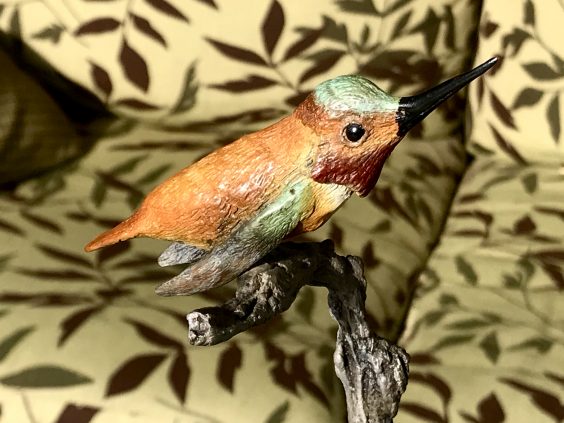
Photo by Toque & Canoe
Are they insects dropping in to visit from an alien planet inhabited only by iridescent, improbably exquisite things?
Just as likely, they’re tropical blossoms broken from their stems and given flight by some quixotic God who wants to confuse us for her own pleasure.
Their nests, I know, are made of spider silk and lichen and other mysterious stuff. Two years ago, we found a tiny pouch, about the size of a walnut, slung low in the magnolia branches.
Patrick wrote, “Tonight I took my shorn hair and laid it on the arms of the pines. / In the mornings the hummingbirds will line their nests with me.” Every time I see a hummingbird in our yard, I wonder if it hatched in the warmth and softness Patrick left behind.
There’s an honesty to ponds. Without guile or coyness, they’ll openly reveal themselves to even a casual tourist, as long as she sits still and watches and listens.
But our pond, at least in winter, holds a secret.
When we moved into the house in December 14 years ago, we saw the sluggish flicker of goldfish suspended in the cold, viscous water, but nothing else. Then we found a note from the former owners on the kitchen counter. Two turtles, it informed us, were buried at the pond’s bottom. They’d been there since October.
In March of that first year and for every March since, one of us has run into the house and cried, “The turtles, the turtles are back,” as if they’ve come home from a long journey. Maybe they have.
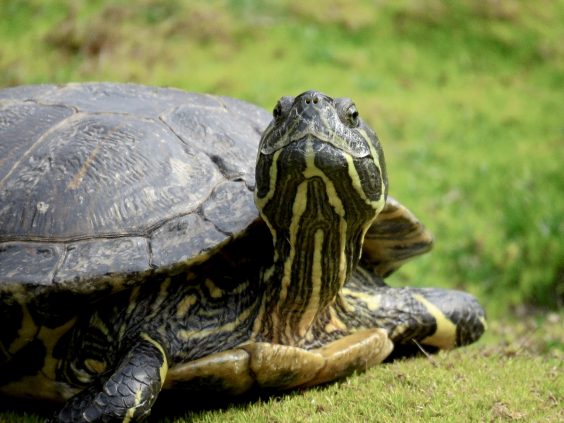
Photo courtesy Lorna Crozier
What they’ve been doing, we discovered, is brumating, a new word for us. It’s a reptilian form of hibernation. The turtles, which are red-eared sliders, slow down their metabolism come fall and sink into the mud until the water and the air warm up. In their sunken hideaway, they don’t need to eat.
More than the blurt of crocuses or the tight buds of tulips uncurling in the sun, the rising of the turtles announces the arrival of spring.
Earlier this year, I ran into the house to tell Patrick I’d seen a nose moving like a blunt periscope on the surface of the pond. He wasn’t there to hear the news. Nor will he be here to go with me when I can leave the yard and travel again.
In a poem inspired by our trip to The Great Bear Rainforest, Patrick wrote “I walked in the hollowed paw prints a grizzly bear left / ten thousand years ago this morning.”
Though his tracks are not visible, though they haven’t sunk deep into the earth like a grizzly’s, I know they’re there.
He has paced every corner of our yard. He has turned over every clod of earth and touched every stone. He has carried in his bloodstream the sound of water. The garden has held him as no other can. And it holds him still, for me.
This morning and every morning I walk in Patrick’s footsteps in this place he loved and nurtured, this sanctuary for what grows and changes and sometimes, in a heartbeat, disappears.
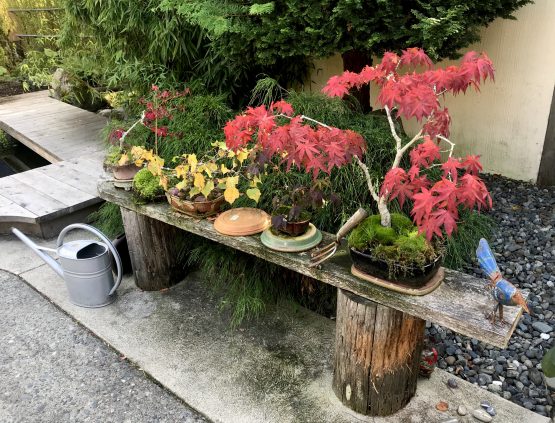
Photo by Toque & Canoe
Lorna Crozier’s latest book, Through the Garden: A Love Story (with Cats), is published by McClelland & Stewart. Patrick Lane, Crozier’s late husband, was a celebrated Canadian writer.
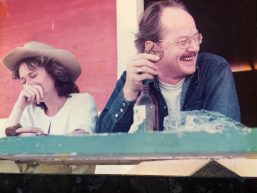
Lorna Crozier & Patrick Lane / Photo by B. Siemens
Founded by two Canucks on the loose in a big country, Toque & Canoe is an award-winning Canadian travel blog. Follow us on Twitter, Instagram and Facebook

Margo commented:
Beautiful. A long-form garden haiku and homage.
Rhonda commented:
I read this as November’s night rain splats into the gutters outside my bedroom window, think of Crozier’s turtles in their mud bed, and thank the traveling poet for taking me on journey small as her backyard yet vast as beauty and the vistas of the heart.
Lorna Crozier commented:
Oh, yes, the turtles are grateful they are in the mud lately during these days of November rain. I must remember hope lies in them, too, in their rising in the spring.
arleen pare commented:
Thanks, Lorna – what a lovely brumination of ponderous wonder – enough beauty to hold us through this whole coming winter.
Lorna Crozier commented:
Thanks for this reply, Margo. I don’t know if you know that our cat who is buried in the garden was named after the haiku master Basho. I’m glad you refereed to haiku. He (both the cat and the poet) would be pleased.
Hi, Arleen. I’m going to hold on to the phrase “pondiferous wonder.”
Jane commented:
Lorna: my favourite voice of the earth. I already know that when next I see a hummingbird nest, I will think of your Patrick.
Lorna Crozier commented:
Thanks, Jane. The visits of the hummingbirds are more special to me now because of Patrick’s poem. that’s what poems should do.
Rena Upitis commented:
Lorna continues to astonish me — those turns of phrase (I mean, really, what mind thinks of “It’s autumn now, but I can still watch hummingbirds whip the pond water like wind-up toys designed by Fabergé”?) but more the way that the journey through the garden brings Patrick to life. There’s timelessness in this writing — “ten thousand years ago this morning” (Patrick’s words), reminding us that we are all just doing the best we can with the “joys and sorrows that make up an earthly life.”
And the photographs — kudos! They are as exquisite as the dragonflies and hummingbirds.
Lorna Crozier commented:
Hi, dear Rena. You are one of the people who keeps me connected with the wonders of the natural world and keeps me going. I so respect what you do at Wintergreen, for nature, for the arts, for community.
Adam commented:
Thank you for sharing this story about your garden. I will remember fondly the days I walked next to Patrick as he shared his wisdom with me. Enjoy the beauty of your garden and the memories it holds for you!
Lorna Crozier commented:
Hi, Adam. I am one of the lucky people in Canada who can say I have a Green MP, Elizabeth May, and you, a Green MLA. You’re doing a wonderful job and giving us all a chance to put the environment first.
Peter Coffman commented:
So beautiful Lorna, thank you. And to me, you now have two gardens: the one conjured in my mind by things you and Patrick have written, and the one I see here in the photographs. They overlap somewhat, but are not the same.
Lorna Crozier commented:
Hi, Peter. For those who don’t know, you are a brilliant photographer and one of my collaborators with Diane Laundy for the book of poems and photos, The House the Spirit Builds. I hope people will check it out.
I wish you’d come to my garden with your camera.
Peter Coffman commented:
I just saw your reply, Lorna… three months late!
We’d love to come, we will come! We just have no idea when…. But someday, travel will be real again.
sherryl andrews commented:
Such a beautiful and loving picture is created by Lorna’s words. I have the privilege to live next door to this glorious garden and its blessed inhabitants. I am so enjoying the pages of Lorna’s latest book!
Lorna Crozier commented:
How lucky I am to have a neighbour like you who makes the best cupcakes in the world, OOlala Cupcakes on Hillside Ave. in Victoria.
Marilyn Taylor commented:
Your writing is full of sensitivity, warmth and love. It inspires me to engage my senses and to look more deeply. Thankyou for sharing your poetry, your prose and your garden.
Lorna Crozier commented:
Hi, Marilyn. I so appreciate your comment. Come and help me in the garden any time.
Jo commented:
I had the pleasure of participating in yoga in Lorna’s garden this fall. Perfectly beautiful, tranquil and peaceful . Thank you for sharing Lorna.
Lorna Crozier commented:
My pleasure to have friends like you in the garden to open my eyes once again to the beauty that is right outside our doors, even if we must go to a park to find it. It’s always nature that gives me strength.
Kelly Joseph commented:
Such beautiful words and such a lovely garden. Thank you, Lorna!
Lorna Crozier commented:
Hi, Kelly. I’m glad my words could bring my garden to you.
Deborah Kerr commented:
Lorna’s words bring me to tears. She is such an amazing writer and her love for Patrick seems to be just as strong as ever. I hope that the pondiferous continues to bring her incredible comfort and pleasure.
Lorna Crozier commented:
Thanks so much, Deborah, for your kind words. Although it’s been over a year I miss Patrick terribly but I’m glad I was able to make him come to life here and in my new book.
Margo Farr commented:
What gorgeous words and visuals, Lorna. I have an even richer love for that garden and pond than before. It all comes alive again and again. Thank you.
Lorna Crozier commented:
Thanks for taking the time to comment, Margo. I guess that’s what we want words, particularly poems, to do–to make things come alive again and again.
Sandra Campbell commented:
I love this earth tour of a small and deeply loved place on this planet. I see anew Mother Earth’s infinite generosity, if only we look, if only we listen. Thanks Lorna for this gift.
Lorna Crozier commented:
Hi, Sandra. If only we could learn to be as generous to the earth as the earth is to us. Maybe young people are making that possible.
Kathryn commented:
What a joyful lament. Reading “What the Garden Holds” transported me into the beautiful garden and into the liminal space between memory and present, a suggestion of all time.
Lorna Crozier commented:
Hi, Kathryn. “A joyful lament”–that’s an oxymoron I will treasure.
Tina commented:
Pondiferous indeed! Another great travel piece in your own back yard. And what a journey. Merci. ‘The joys and sorrows that make up an earthly life’.
Lorna Crozier commented:
Hi, Tina. The back yard would not be what it is without your presence.
Leslie Uyeda commented:
This is a beautiful, poignant piece, a loving eulogy to Patrick, a gift of sheer delight for all of us who love Lorna’s wizardry with words. Thank you Lorna, thank you Toque and Canoe. Leslie
Lorna Crozier commented:
Toque and Canoe thanks you, Leslie, for taking the time to respond. I’d love to hear the music that could accompany this piece, music from my favourite composer, who is of course you.
Annie Deeley commented:
Lorna, I can hear this piece as though you were reading it. My body leans toward it and listens. Thank you.
Thanks also for the wonderful pictures.
Lorna Crozier commented:
Hi, Annie. I love it when words and pictures dance together. Toque and Canoe really gets that.
Donna Sharkey commented:
Your garden is spectacular, your writing is glorious, and the photos bring hope and calm to my heart.
Lorna Crozier commented:
Thank you, Donna. We all need hope and calm right now. I hope you’re finding it in all kinds of other places.
Jane commented:
Bright and tender thoughts, reflect my own and bring them to the light.
Marlyn Horsdal commented:
Thank you, Lorna, for your lovingly observant eye and your magical use of language, and thank you, T and C , for bringing us this very moving article.
Lorna Crozier commented:
Hi, Marlyn. I know you have your own small paradise on Saltspring Island. I hope it is keeping you safe and connected in these times.
Heidi Garnett commented:
What a privilege it was to visit Patrick at his home one day with my friend, Richard. We were honoured with a tour of the garden, each section choreographed according to colour, shape and flowering time and, then, there was the pond with its darts of orange and beside it a moss garden that Patrick had given its freedom. After Patrick died I asked Lorna if I could leave a piece of art glass the shape of a rounded stone somewhere in the garden and she told me to leave it somewhere that spoke to me. After walking about the garden several times, I chose the moss garden and set it among the stones. Recently, Lorna told me the piece of glass is almost grown over, so apt.
Lorna Crozier commented:
Hi, Heidi. That piece of art glass, barely visible, still winks from the moss. I love how it is sinking into the green as if it truly belongs there.
Renee Woodsend commented:
Lorna’s writing is always a joy. Her observations are direct and insightful. They share with the reader her delight in the magic of the everyday. Most of all I love the fact that Lorna shares herself and her inner life with her readers so that the writing becomes a gift to us all from a Canadian treasure.
Lorna Crozier commented:
Good to hear from you, Renee. Check out all of the other pieces on this marvellous site. They fill me with such joy over what the natural world in our own country can bring us.
Lynn Eyton commented:
As always , Poet Lorna’s stunning prose always makes me feel I am right there in the place she is so beautifully describing . Through The Garden : A Love Story ( With Cats) is full of such touching moments , honesty , courage and hope for the future And humor – so we can cry , laugh and have hope – all So incredibly important , especially in these difficult times … as always , I look forward to her next book of Prose and Poetry … and will always think about Patrick especially when I see a Hummingbird ..
Lorna Crozier commented:
Oh, Lynn, yes the hummingbirds!!
Lynn Eyton commented:
As always , Poet Lorna’s stunning prose always makes me feel I am right there in the place she is so beautifully describing . Through The Garden : A Love Story ( With Cats) is full of such touching moments , honesty , courage and hope for the future And humor – so we can cry , laugh and have hope – all So incredibly important , especially in these difficult times … I will be watching for a Hummingbird ..
Angie Abdou commented:
Lovely! Thank you for sharing, Lorna. A beautiful contemplation. Very moving. I’ll try to carry this alertness, attention, love, and appreciation into my own day.
Lorna Crozier commented:
Hi, Angie. I’m glad I have a moss-footed cat to walk in the garden with me. She doesn’t tear anything up. I wonder what your two beautiful dogs would do! Thanks for your comment.
Rosie O’Neill commented:
Loved this story
Lorna Crozier commented:
Thanks for reading this, Rosie. Isn’t Toque and Canoe a wonderful e-magazine? They have such high production standards, hence the design and the way the photos and words complement each other.
Susan Alexander commented:
Oh yes — such attention here!
After reading this I can only hope that one day I too will look for the transparent castoffs of dragon fly nymphs, have that kind of a quiet eye.
Susan
Lorna Crozier commented:
Hi, Susan. I love your phrase “such a quiet eye.” I’ll try to hang onto that!
Lorna Crozier commented:
Thanks for this reply, Margo. I don’t know if you know that our cat who is buried in the garden was named after the haiku master Basho. I’m glad you refereed to haiku. He (both the cat and the poet) would be pleased.
Russell Brown commented:
I only just caught up with this piece. A lovely prose meditation from a lovely poet, whose work I’ve followed assiduously ever since her 1985 collection of poems, The Garden Going on without Us. This piece serves as a beautiful complement to her recent memoir/eulogy Through the Garden: A Love Story (with Cats).
Lorna Crozier commented:
Thanks, Russell. Gardens, as you know, have been essential to my life and writing, especially now perhaps. I remember Patrick saying you can build a garden in thimble, so those who don’t have the privilege of yards, might be able to still find the pleasures in a small bit of nature.
Berniece Gowan commented:
Good morning Lorna,
this is such a beautiful piece. ‘the joys and sorrows that make up an earthly life.’ Thank you.
Berniece Gowan commented:
stumbled upon this again today. Thinking of you,Lorna, as spring rises once again.
Garth Storebo commented:
Hello . My mom tought us to appreciate spoken word that paints an image or an emotion. Now at 89, she buried her dog ( lilly) beside the garage door,and I’ve been trying to find a poem of yours for solice. Please name a book or a poem for me. She walks slower
toque & canoe commented:
Hi Garth – This just in from Lorna!
Hi, Garth. Thank you for your note. Please give your mom my best and my
sympathy over the loss of Lily. I’ve missed my animals as much as I’ve
missed people.
I don’t have a poem which would address this specifically, but here are a
couple of poems of hope which might bring her comfort.
Warmest,
Lorna
THE SOULS OF ANIMALS
“Having no souls, they have come,
Anyway, beyond their knowing.”
–James Dickey “The Heaven of Animals”
If animals have no souls
it’s because they do not need them.
There is something forever about their time
on earth, whether they move on wing, paw or hoof,
or slide with huge, cold bodies
across the blue-green worlds.
Wherever they dwell, their gaze
when they look at you
comes from a great height–
the yellow of hawk and panther eye–
or so close up
they’ve slipped under the leaves
of your eyelids and stare from the inside out.
In books of the dead the human soul
becomes bird or butterfly
or soft-pawed, graceful thing.
Grant animals a soul: might it not leave
their bodies in the shape of ours?
Assume the best of us, the high forehead,
the shapely arms, the exactitude of
thumb on index finger.
That’s what those bright ones are,
those people we glimpse with a glow about them,
an ecstacy. The souls of animals
crossing from one country to another,
pausing for a moment among us
only to rise in glory,
beasts again.
SMALL LESSON
Hoarfrost feathering the window
and behind that a high cloud
and behind that the hunter’s moon.
Three things without
a light inside them
yet how they shine.
SOMETHING ELSE
Belly-snug on the floor, linoleum
warmed by the woodstove, I watched
the tongue of our new pup lapping milk.
Red as a fox, she fit into my mother’s hand.
I told my friends she’d come from far away
by train, told them my father claimed her
at the station in a wooden box like the ones
full of oranges from Japan. Just last year
Mom said I’d got it wrong. She came from
Mrs. Rittinger on Sixth, we lived on Fourth.
Those days, Dad drove an oil-delivery truck.
Behind his boss’s back, he’d swapped a good month’s
worth of heat for a purebred Pomeranian.
Though she became my brother’s dog
she slept with me because he tossed
too much in sleep. When she was older
if I moved at all, she’d growl and nip.
I learned to lie like a statue on a tomb,
carnelian dog on a marble cushion at my feet.
One morning from the neighbour’s porch
I saw her skulk past our kindling stack
and with her teeth turn the wooden latch
on the cage Dad had built to hold two ducklings
he’d won tossing coins at the summer fair.
(no stanza break)
He was always winning things like that-
a guinea pig named Elvis, a one-winged turkey,
those golden ducks I loved.
From a distance I couldn’t cross,
I watched her disappear into the cage
then back right out, her muzzle bloody.
She made no sound, just closed the latch-
she was that smart-then trotted off between the lilacs.
Mom said later the dog was jealous;
the ducks had trailed my brother everywhere
as I did if he’d let me.
When my brother left for good, she was mine
as much as anyone’s. For a time she followed me
as if I’d take her to him. I didn’t know where
he’d gone, just far away, too far for him
to write or visit. Things changed
then. Everything got older fast.
The day my father put that small red pup
beside the kitchen stove,
my mother named her Tiny.
I would have called her something else.
Garth Storebo commented:
Thank you so much for the poems you sent me for consoling my mom with the loss of her dog “Lilly “. We enjoyed tears and laughter.